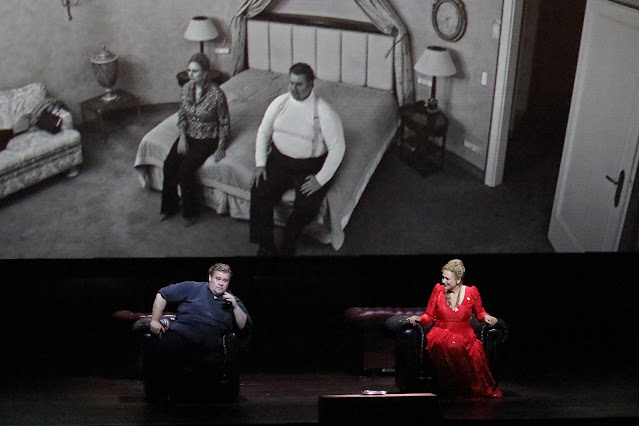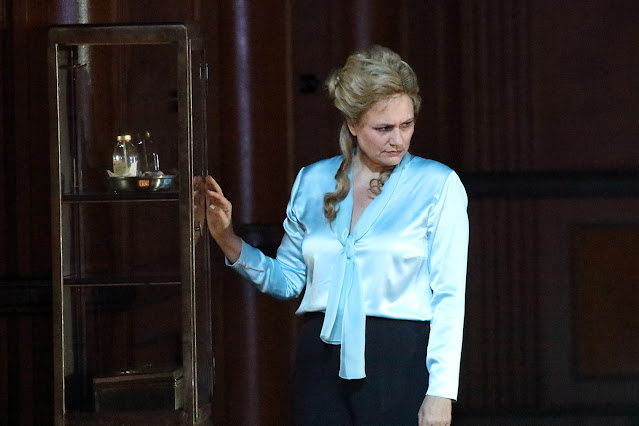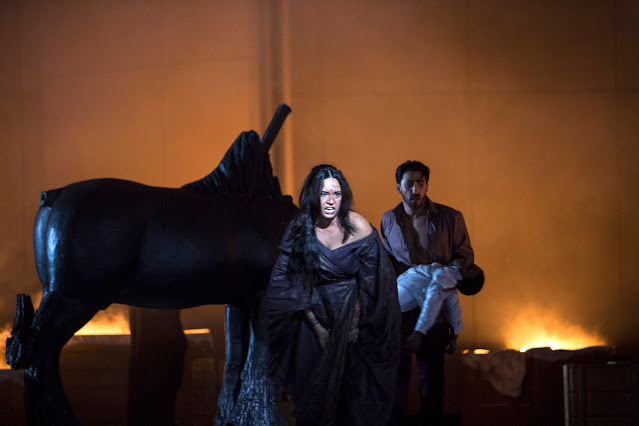Nationaltheater
Tristan – Stuart SkeltonKing Marke – René Pape
Isolde – Anja Kampe
Kurwenal – Wolfgang Koch
Melot – Sean Michael Plumb
Brangäne – Jamie Barton
Shepherd – Jonas Hacker
Steersman – Christian Rieger
Young Sailor – Liam Bonthrone
Krzysztof Warlikowski (director)
Malgorzata Szczęśniak (designs)
Felice Ross (lighting)
Kamil Polak (video)
Claude Bardouil (choreography)
Miron Hakenbeck, Lukas Leipfinger (dramaturgy)
Chorus of the Bavarian State Opera (chorus director: Johannes Knecht)
Bavarian State Orchestra
Lothar Koenigs (conductor)
 |
| Images: Wilfried Hösl Tristan (Stuart Skelton) and Isolde (Anja Kampe) |
Krzysztof
Warlikowski’s Tristan, first seen two years ago, marking an end to Nikolaus
Bachler’s intendancy, is on first sight at least, a puzzling affair. There are
ideas, certainly, though quite how they connect, let alone cohere, lay largely
beyond me. They seemed, moreover, to bear precious relation to this most
treacherous of works, perhaps the most resistant of all operas—if one may call
it an opera at all—to intervention from without. Its action is almost entirely
interior, and directors forget (or fail to realise) that at their peril. The
only production I have seen to take a fair shot at divesting Tristan of its metaphysics
was Dmitri
Tcherniakov’s for the Berlin Staatsoper in 2018, though I seem to have been
largely alone in responding positively to its provocations—and had, I admit, to
do a considerable amount of reading against the grain.
Strange mannequins were seen first in the opening Prelude. Was there some sort of cyber-intent here? Perhaps, but if so, again I am at a loss as to what or why. A whole family of them, puppets added to the two original actors, joined Tristan at his table in Kareol. It was presumably a metaphor for something, or perhaps Warlikowski just liked the look of them. If we were entering the world of the posthuman, it was a tentative entry that appeared to be revoked.
 |
| Isolde |
Malgorzata Szczęśniak’s designs were not entirely dissimilar to Tchernaikov’s. A luxury ship, albeit in darker wood, served for the rest too, including what seems during much of the first act also to be some sort of treatment facility, Brangäne as nurse. These are damaged people, I suppose, as Christoph Marthaler at Bayreuth insisted on telling us (without saying anything else much), but who was who and why they were doing what they were doing to whom often eluded him. Quite why the Sailor, for instance, was being blindfolded and abused as he was for much of the act, before abruptly disappearing and never being seen again, I could not tell you. I liked the keen sense of the hunt, both in scene and costume design, in the second act; that framed very nicely what transpired on stage. An alternative action unfolded on film, though, in which Isolde made her way to a hotel room, eventually joined by Tristan. Whatever their motive, it was not a night of passion that unfolded, but rather a bit of pacing, sitting, and lying down. I do not think this was to send up the plot; Carry on Tristan did not seem either to be the intention or the result, but I am not entirely sure.
The lovers were together at the end on film, having necessarily died separately onstage. (Whether Isolde dies at all should be an open question, but anyway...) I assume this was some sort of greater
reality, or maybe it was ‘just’ a fantasy, though in that case, whose? For if
the words Isolde sings are delusional, a sort of locus classicus of what
George Steiner diagnosed –as, ironically, had Wagner and Nietzsche – as Christianity’s
death blow to the tragic impulse, her ‘transfiguration’ (Verklärung) has
wonders, to put it mildly, of its own. A couple lying chastely and smiling at
each other on a hotel bed, having attempted suicide and perhaps (who knows?)
about to die, has fewer if any such wonders to offer. I realise this may be a
reference to Lars von Trier’s Melancholia, yet in itself, so what? The
extraneous does little good in Tristan and, for the most part, simply
gets in the way. Contemporary directors may view metaphysics with suspicion, yet
to tackle this work they should do it the courtesy of treating its claims
seriously before denying them. If loneliness were Warlikowski’s ultimate
guiding concept, and I think it may have been, surely he cannot have been suggesting
Tristan or what ‘happens’ in it offered some sort of cure?
 |
| Tristan and Isolde |
Musically, we were on firmer, coherently moving ground. Eight years ago, Waltraud Meier sang farewell to Isolde in this theatre, in Peter Konwitschny’s far more single-minded production. Anja Kampe proved every inch her successor. I have never heard anything but excellence from her; this Isolde, imperious, tender, and almost every shade in between, proved no exception. She had a grand manner when called for, but it was part of her portrayal, not a singer’s persona; words, music, and gesture were married in properly Wagnerian harmony. As Tristan, Stuart Skelton certainly had heft, yet he offered here, to an unusual extent for this role, an interiority founded on verbal detail and consequent colouring. Perhaps one missed a little of the soaring intensity of some Tristans, but one cannot have it all—and, with some, one has precious little at all. This was rare compensation. René Pape’s King Marke was as fine a performance as I have heard from him. There has never been any doubting the beauty of his voice, but the portrayal seemed to have gained depth, not only in his way with words but his mournful, steadfast stage presence too. Jamie Barton’s Brangäne was sincere, communicative, richly resonant. Wolfgang Koch’s Kurwenal offered a sardonic bite otherwise only really experienced in Kampe’s Isolde. From the rest of the cast, all roles well taken, Sean Michael Plumb’s Melot was vocally bright, even vivid, in a performance having one wish he had more to sing. Liam Bonthrone’s Sailor offered a clarity in song Warlikowski denied him conceptually.
 |
| Tristan and King Marke (René Pape) |
The Bavarian State
Orchestra played with a mastery born of years’ immersion in this score and
Wagner in general that must have been apparent to all. There are doubtless
several ways to be ‘right’ here; prescription is neither necessary nor
desirable. But there was no doubting that this was one of them, the Munich
strings dark yet glowing, fundamental in more than one sense to the mysterious
surging of the Schopenhauerian Will. Lothar
Koenigs’s quietly confident leadership of the performance proved impressive
in cumulative effect. One did not notice a conductor’s personal ‘ideas’
about the score; one fancied one simply heard the score, whose power built
until the end of each act left one reeling. How much more powerful this might
have been with a stronger staging, we cannot know, but there was enough Wagner
here to satisfy any listener.
.jpg)
.jpg)












,%20Siobhan%20Stagg%20(Susanna),%20Siobhan%20Stagg%20(Susanna),%20The%20Marriage%20of%20Figaro%20%C2%A9%20ROH%202023.%20Ph%20Clive%20Barda.jpg)
,%20The%20Marriage%20of%20Figaro%20%C2%A9%20ROH%202023.%20Ph%20Clive%20Barda%20(1).jpg)
%20(1).jpg)
,%20The%20Marriage%20of%20Figaro%20%C2%A9%20ROH%202023.%20Ph%20Clive%20Barda.jpg)
,%20The%20Marriage%20of%20Figaro%20%C2%A9%20ROH%202023.%20Ph%20Clive%20Barda.jpg)